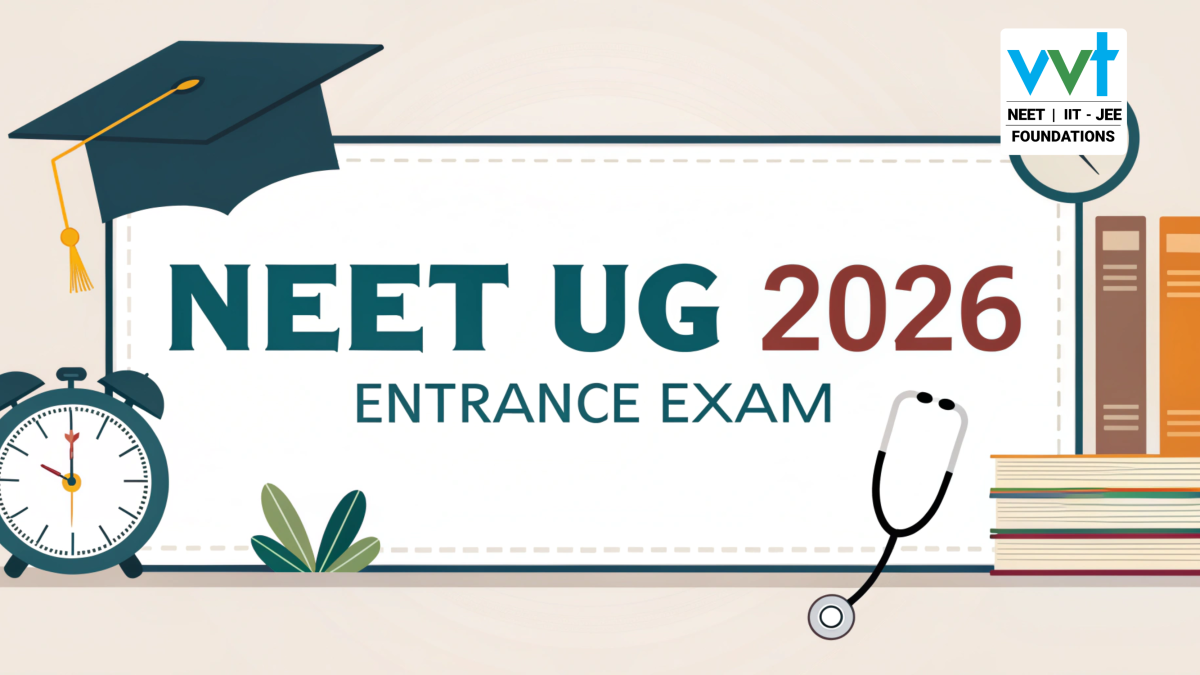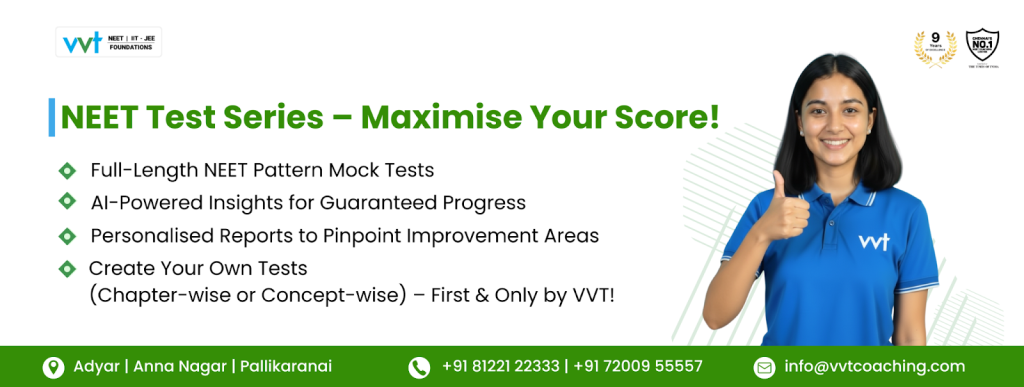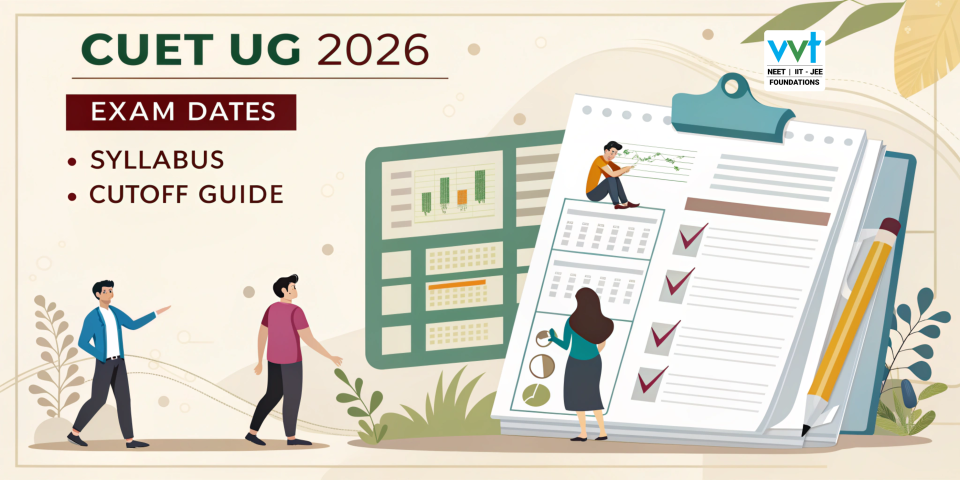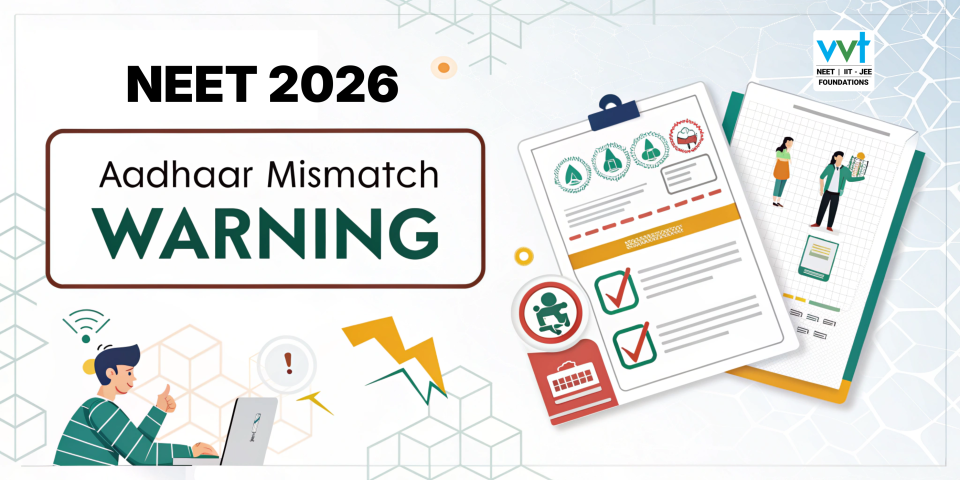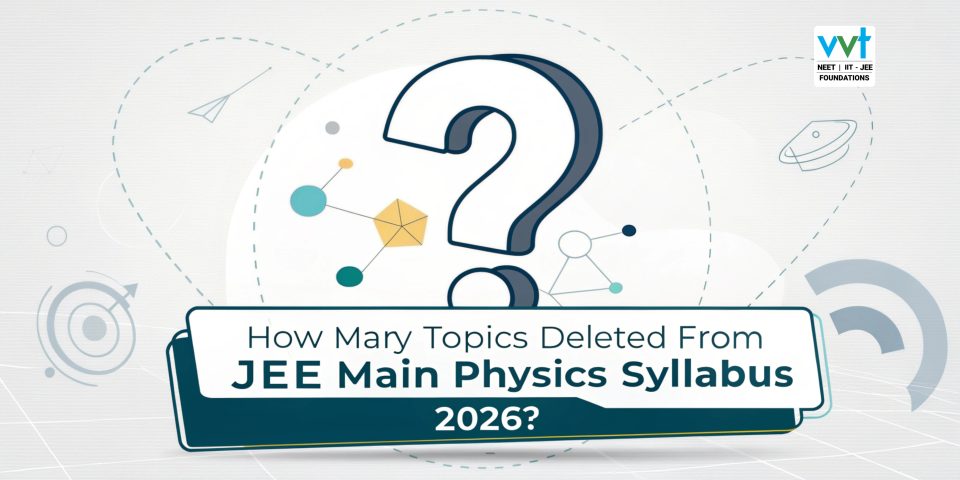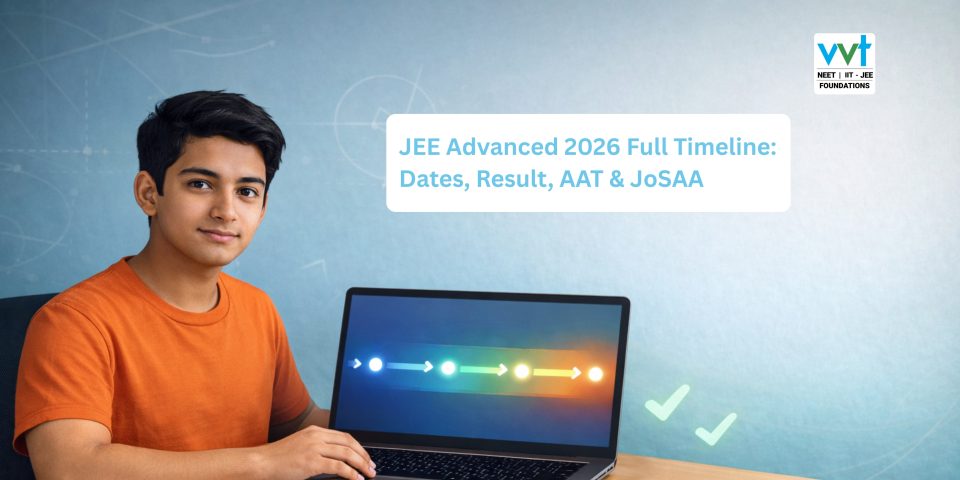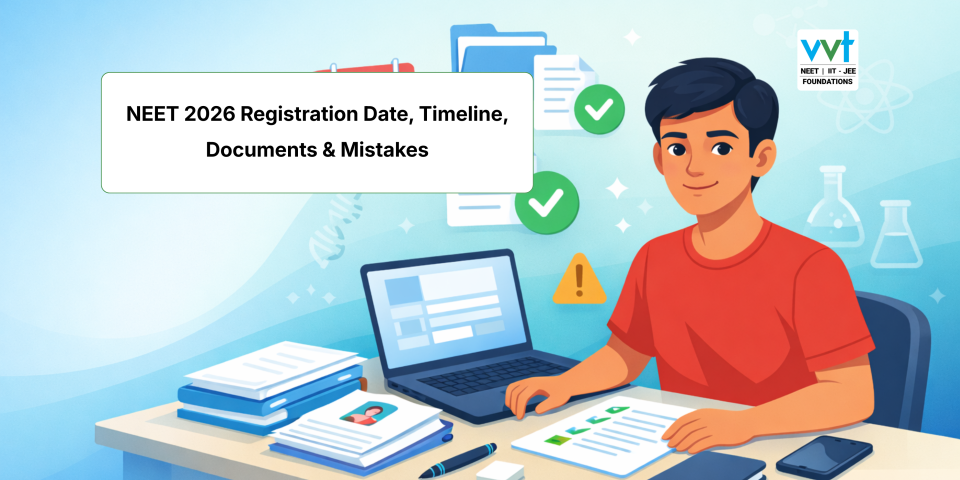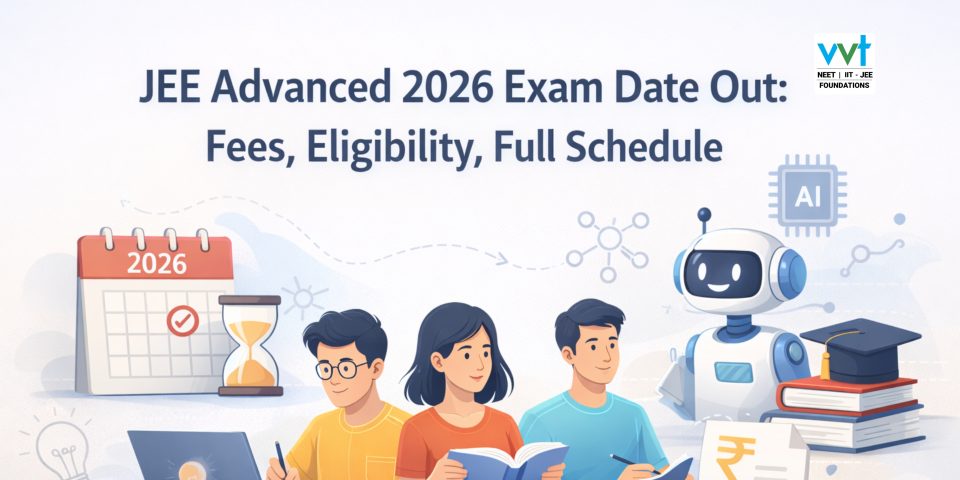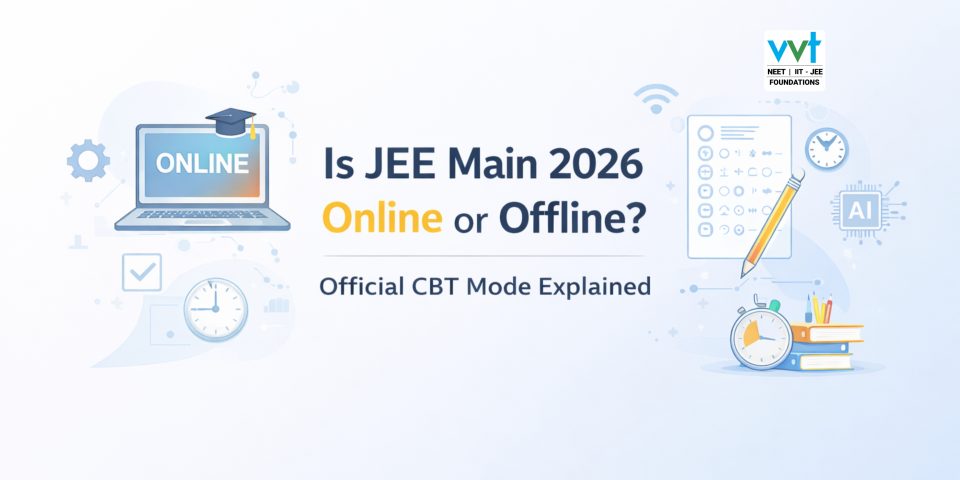
VVTSAT: How to Get Up to 100% Scholarship at VVT Coaching for NEET & JEE
November 22, 2025
60-Day JEE Main 2026 Plan to Boost Accuracy, Speed & Percentile
November 24, 2025NEET UG 2026 Entrance Exam: Complete Guide for Medical Aspirants
VVT Coaching Chennai – Ranked #1 Best NEET&JEE Coaching Centre by Times Now!
If you’re aiming for MBBS, BDS, AYUSH, or other medical courses in India, NEET UG 2026 is your biggest academic checkpoint.
This guide keeps things straightforward and student-friendly.
You’ll find:
- What NEET UG 2026 looks like
- Who can apply and basic eligibility
- The exact exam pattern and marking scheme
- A realistic timeline to plan backwards from
- A prep blueprint you can start today
- Practical tips to stop “mark leakage”
- A clear FAQ section
- And how VVT Coaching can turn your effort into predictable score growth
Use this as your base document for the next year, not something you read once and forget.
NEET UG 2026 at a Glance (Quick Facts)
| Item | Details |
| Conducting Body | National Testing Agency (NTA) |
| Mode | Offline (pen-and-paper, OMR based) |
| Duration | 3 hours (180 minutes) |
| Subjects | Physics, Chemistry, Biology (Botany + Zoology) |
| Question Format | Multiple Choice Questions (MCQs) |
| Total Questions | 180 (all compulsory) |
| Total Marks | 720 |
| Marking Scheme | +4 for correct, −1 for incorrect, 0 for unattempted |
| Languages | 13 languages (including English, Hindi, Tamil, etc.) |
| Attempts | No limit on number of attempts (as per current norms) |
Quick tip: Practise with real OMR sheets at least once a week. Bubbling mistakes can easily cost 20–30 marks if you never train that muscle.
Eligibility Criteria (Check This Before You Apply)
| Criterion | Details |
| Age | Minimum 17 years as of 31 December 2026. No upper age limit as per current rules. |
| Qualification | 10+2 (or equivalent) with Physics, Chemistry, Biology/Biotechnology and English. |
| Minimum Marks | UR/EWS: 50% in PCB; OBC/SC/ST: 40% in PCB; PwD: 45% in PCB (aggregate). |
| Attempts | No cap on the number of attempts as long as other criteria are satisfied. |
| Nationality | Indian citizens, NRIs, PIOs, OCIs and Foreign Nationals can apply as per guidelines. |
Document checklist (start early):
- Category certificate (OBC-NCL / EWS / SC / ST), if applicable
- PwD certificate in prescribed format (if claiming PwD quota)
- Valid photo ID (Aadhaar / PAN / Passport / other accepted ID)
- Recent passport-size photographs and signature in proper size and format
Exam Pattern & Marking Scheme (Updated)
NEET has reverted to a simple, pre-COVID style pattern:
- No optional questions
- No Section B
- 180 compulsory questions in 3 hours
Subject-wise Question & Mark Distribution
| Subject | Number of Questions | Marks |
| Physics | 45 | 180 |
| Chemistry | 45 | 180 |
| Botany | 45 | 180 |
| Zoology | 45 | 180 |
| Total | 180 | 720 |
Marking scheme:
- +4 for every correct answer
- −1 for every incorrect answer
- 0 for unattempted questions
Exam mindset: You’re not choosing which questions to ignore forever, you’re deciding which ones to do first and which to revisit with fresh eyes in the last 30–40 minutes.
Tentative Timeline for NEET UG 2026 (Plan Backwards)
Exact dates will be announced in the information bulletin, but a typical cycle looks like this:
| Milestone | Likely Window |
| Information Bulletin | Nov–Dec 2025 |
| Registration Window | Dec 2025 – Jan 2026 |
| Correction Window | Jan–Feb 2026 |
| Admit Card | 3–7 days before exam |
| Exam Date | May 2026 |
| Answer Key & OMR | 1–2 weeks post exam |
| Result | 4–6 weeks post exam |
Smart move: Don’t wait for notifications to “start preparing”. Use dates only for form filling and logistics. Preparation should start now.
Syllabus Snapshot (High-Yield Themes)
You must follow the official NEET syllabus for Class 11 & 12, but these are the chapters that repeatedly carry weight.
Biology (NCERT First, Always)
Biology carries half the paper. Most questions are directly or indirectly from NCERT.
- Human Physiology (digestion, respiration, circulation, excretion, neural and endocrine control)
- Genetics & Evolution
- Reproduction (plant + human)
- Cell Structure & Function
- Plant Physiology
- Ecology & Environment
- Biomolecules
- Biotechnology & its Applications
Non-negotiable rule: Read NCERT like a storybook and like a law book every line, figure, table and flowchart matters.
Chemistry
Split your thinking into three: Physical, Inorganic, Organic.
Physical Chemistry
- Thermodynamics
- Chemical & Ionic Equilibrium
- States of Matter
- Electrochemistry (fundamentals)
- Chemical Kinetics (core concepts)
Inorganic Chemistry
- Periodic Table & Periodic Trends
- Chemical Bonding (VSEPR, hybridisation, basic MO ideas)
- s-block & p-block key reactions
- Coordination compounds (nomenclature + basic properties)
Organic Chemistry
- GOC (effects, resonance, inductive, hyperconjugation, acidity/basicity trends)
- Hydrocarbons
- Haloalkanes & Haloarenes
- Alcohols, Phenols, Ethers
- Aldehydes, Ketones, Carboxylic Acids
- Amines
- Biomolecules & basic Polymers
Anchor idea: If your GOC + Bonding are rock solid, 60–70% of tricky Chemistry questions stop looking scary.
Physics
Physics is where most students feel the “pain”, but also where rank differences are created.
Key blocks:
- Kinematics (1D & 2D) + Motion Graphs
- Newton’s Laws of Motion
- Work, Energy & Power
- System of Particles & Rotational Motion (COM basics)
- SHM & Waves
- Thermodynamics & Kinetic Theory
- Electrostatics
- Current Electricity
- Magnetism & Electromagnetic Induction
- Ray Optics & Wave Optics
- Modern Physics (photoelectric effect, atomic models, nuclei basics)
Focus on understanding why a formula works, not just plugging values. Once concepts are clear, speed comes naturally with practice.
Clean Prep Blueprint (You Can Start Today)
The 21-Day Momentum Plan
Use this when you feel “stuck” or as a starter to make your prep serious.
1–7 Days: NCERT + Fundamentals
- Daily NCERT reading from at least one subject
- 40 MCQs/day (easy to moderate)
- Start an Error Log: every wrong question → write:
- What went wrong? (Concept / Calculation / Misread / Guess)
8–14 Days: Add Timed Tests
- 45–60 minute mini-test on alternate days
- Use your Error Log to see patterns (e.g., always losing marks in graphs, sign conventions, specific chapters)
15–21 Days: Subject Tests + Re-tests
- Take one subject-wise test (Physics or Chem or Bio) every 2–3 days
- Same day: do a full analysis
- Within 48–72 hours, re-test weak topics from that paper
Track only three numbers:
- Accuracy %
- Average time/question
- Number of repeat mistakes
If these improve, your overall marks will follow.
Month-1 Starter Calendar (Example)
| Week | Biology | Chemistry | Physics | Tests & Fixes |
| 1 | Cell & Biomolecules | Chemical Bonding | Kinematics + Graphs | 2 mini-tests + 1 dedicated error-review session |
| 2 | Plant Physiology | Equilibrium (chemical + ionic) | Laws of Motion | 1 subject test + remedy-style revision |
| 3 | Human Physiology – I | Thermodynamics | Work, Energy & Power | 2 mini-tests + 1 re-test (48–72 hours later) |
| 4 | Human Physiology – II | GOC basics + acidity/basicity | COM & Rotation (intro) | 1 full subject mock + structured error exam |
From Month 2 onwards:
- Maintain 1 full mock/week
- From Month 4 onwards:
- Increase to 2 full mocks/week, only if you are doing proper analysis and re-testing.
Mocks without analysis = just collecting marks, not growth.
Stop the Fastest Mark Drains
A lot of students lose 50–100 marks not because they don’t know the content, but because of pattern-level mistakes.
1. Blind Guessing → Negative Marks
- Use a 90-second rule per question
- If stuck, mark it for review, move on, return later
- Don’t let ego keep you glued to a single stubborn question
2. Ignoring Diagrams in Biology
- Do one labelled diagram per day (e.g., nephron, heart, chloroplast, meiosis stages)
- Solve 10 diagram-based MCQs along with it
3. Units & Sign Errors in Physics
- Always write units till the final step early in your prep
- Fix one sign convention (e.g., upward positive / left negative, etc.) and never change it
- Keep a small “Units & Constants” page handy
4. No PYQ Rhythm
- Do topic-wise PYQs three times a week
- NEET loves repeating archetypes, even if the exact numbers change
5. No Review Routine
- Dedicate 15–30 minutes daily to your Error Log
- Re-attempt those exact types of questions within 2–3 days
- Without this loop, you’ll keep repeating the same mistakes in every mock
Self-Study vs Guided Support (What Actually Fits You?)
| Path | Pros | Watch-outs | Best Next Step |
| Pure Self-Study | Flexible, low-cost, total control | Easy to lose structure & depth | Fix a 21-day routine + maintain a serious error log |
| Self-Study + External Mocks | Real exam feel, some performance data | Data often gets ignored | 1–2 mocks/week + fixed analysis time after each test |
| VVT Full-Stack Support | Mentors, AI-analytics, Error Exams, Remedy Classes | Needs consistent participation | Let mentors set weekly goals, follow Error Exam + Remedy cycles |
Self-study works if you’re extremely disciplined and analytical.
Most students do better when data, mentors and a system guide their effort.
How VVT Coaching Converts Effort into Marks
When every mark matters, you don’t just need more content, you need feedback and correction that doesn’t depend on guesswork.
That’s where VVT Coaching comes in.
Error Exams – Fix What Hurts Your Score the Most!
Instead of just giving you new papers, VVT generates Error Exams:
- Tests made largely from similar questions you previously got wrong or left
- This forces you to face your weak patterns until they stop being weak
- Over time, your “small mistakes” and recurring concept errors drop sharply
AI-Powered Mock Tests – Honest, Deep Analytics!
Every test you write at VVT:
- Breaks down topic-wise accuracy
- Shows time spent per question and per section
- Flags overthinking zones and panic points
- Compares your performance with top scorers
You don’t just know “I got 520”, you know exactly where 40–80 marks are still sitting on the table.
Personalised Guidance!
Every serious aspirant needs someone who sees the full picture.
At VVT Coaching:
- A mentor tracks your mock scores, error patterns, and timetable
- Helps rebalance when you’re overloaded with school/boards
- Keeps you from slipping into all-or-nothing moods (“I’m finished” vs “I’m a genius” days)
You’re not left wondering “Ab kya karun?” after every test. You always have a next step.
Remedy Classes – Fast Repair for Weak Topics!
Remedy Classes at VVT are designed to save time and marks:
- Short, focused sessions on micro-topics you’re struggling with
- Planned using AI insights + faculty observation
- Usually followed by re-testing to check if the gap actually closed
So instead of listening to the same chapter again fully, you repair exactly what’s broken.
Conclusion
NEET doesn’t reward random grinding.
It rewards:
- Clear concepts
- Fast, calm decisions under pressure
- A habit of reviewing and fixing mistakes
If you focus on high-frequency themes, master NCERT, and treat every mistake as data, your score will rise, even if the paper feels unpredictable.
If you want that entire journey to run like a well-designed system, VVT Coaching brings all the pieces together:
- AI-backed mock tests and analytics
- Error Exams that directly target your mistakes
- Remedy Classes to patch gaps quickly
- Personalised guidance so you never feel lost or alone in the process
Your preparation becomes focused, measurable, and repeatable, exactly what NEET demands.
Start today:
- Visit www.vvtcoaching.com
- Call +91 81221 22333
And if fees worry you, remember:
Scholarships up to 100% on tuition fees are available through VVTSAT for deserving students.
Your NEET UG 2026 story can still be built, one honest, well-planned week at a time.
Get to Know VVT’s Three Friendly Campuses: Always Nearby and Welcoming
VVT has three spots across Chennai, each easy to reach and full of support. No matter where you live, one is close by. Our campuses mix bright classrooms, helpful teachers, and a warm feel to keep you going. Here’s a quick look at each, with a focus on how they help with NEET and staying options.
Adyar Campus: Easy Access and Positive Vibes
Right on busy L.B. Road next to Adyar Ananda Bhavan, this spot is super convenient. Step inside, and you’ll see big, airy rooms where learning feels fun. Staff greet you with smiles, and the energy pushes you to turn weak areas like tough Physics problems into strengths.We also offer hostel facilities here for boys, with clean rooms, meals, and support to make your stay comfortable and focused. No distractions, just a safe place to rest and review after classes.
Adyar Campus (VVT Coaching Centre): “Nibav Buildings”, 4th & 5th Floor, No.23, Old No.11, L.B. Road, Adyar, Chennai – 600020. (Next to Adyar Ananda Bhavan)
Get Directions: Open in google maps!
Anna Nagar Campus: Focus in the City Centre
In Shanthi Colony, Anna Nagar, this campus feels like an extension of home. Good bus links make it simple for city kids. There is no on-site hostel, but nearby options are plentiful for those who need them.
Anna Nagar Campus (VVT Coaching Centre): No.1621, 9th Main Road, Shanthi Colony, Block AI, Anna Nagar, Chennai – 600040.
Get Directions: Open in google maps!
Pallikaranai Girls Campus: Your Safe Place with Full Hostel
This is our special girls-only residential campus in a quiet area. It’s built as a true home away from home, with clean dorms, healthy meals in the canteen, and round-the-clock help.
We offer full hostel facilities here, clean rooms, study areas, and a community of girls supporting each other. It’s perfect if you’re from outside Chennai or just want a focused, safe space.
Pallikaranai (Saraswathi Girls Residential Campus): Plot No. 395 & 396, 1st Main Road, Kamakoti Nagar, Pallikaranai, Chennai – 600100.
Get Directions: Open in google maps
FAQs — NEET UG 2026
Q1. Is NEET UG online or offline?
NEET UG is conducted offline, using pen-and-paper OMR sheets.
Q2. How many questions should I attempt?
All 180 questions are compulsory, but that doesn’t mean you must answer every single one blindly. The goal is to:
- Attempt as many questions as possible
- While protecting your accuracy to avoid heavy negative marking
Q3. How can I reduce negative marking?
- Follow the 90-second rule and move on when stuck
- Attempt sure-shot questions first
- Don’t change answers in the last minute unless you’re very sure
- Train with full-length mocks under real conditions
Q4. Is NCERT enough for Biology?
For Biology, NCERT is non-negotiable and covers the bulk of questions:
- Learn every definition, table and diagram
- Then reinforce with topic-wise MCQs and previous year questions
Q5. How do I balance Boards and NEET?
- Use overlapping topics (like Equilibrium, Human Physiology, Electrostatics) for both
- Use weekdays for boards + concepts, weekends for NEET-style tests and analysis
- Avoid separating “board study” and “NEET study” completely; integrate them where possible.

